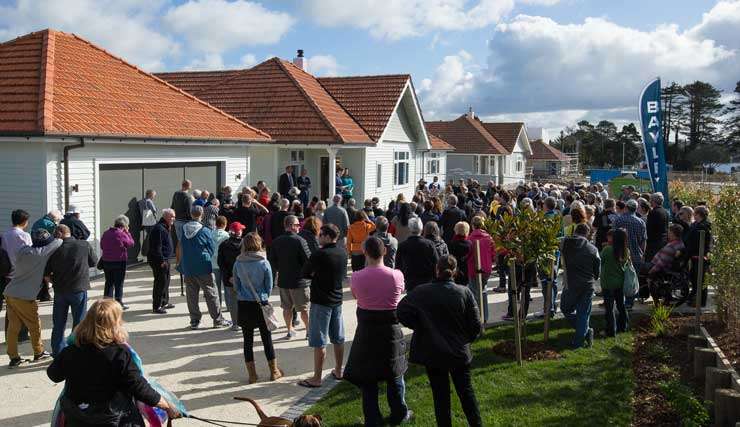Auctions are making a strong comeback, with clearance rates in Auckland rising back to levels not seen since the market peak more than two years ago.
For vendors, there is renewed confidence in sales under the hammer, reflected in the packed auction rooms and above-CV prices being achieved in recent weeks.
But for buyers who are new to the market or have simply forgotten what the boom years were like in Auckland, auctions can be a nerve-wracking experience.
The shift in the market has meant more competition and a lift in prices, with properties that may have been buyer price ranges six months ago now out of reach.
Start your property search
OneRoof editor Owen Vaughan says this can lead to a certain amount of buyer frustration. "Indeed, a frequent complaint among buyers during the boom years was the amount of money they'd spent doing due diligence only to find themselves blown out of the water at the auction," he says.
"A pre-purchase inspection can cost $500 or thereabouts; a Lim report is between $200 and $400 and sometimes banks require a registered valuation, which can cost $1000. On top of that there are lawyers’ fees. All of this is money well-spent for peace of mind but if you miss out on a few properties at auction this can rack up to thousands of dollars."
Do your research
Vaughan says there are certain things buyers can do to avoid what can be an expensive and, potentially, demoralising cycle.
"In a rising market, as in a falling one, it pays to check out how many people are at the open homes of the properties you are interested in. If the opens homes are busy, you can assume you'll be facing a lot competition in the auction room; if they aren't, then your competition may be low. And don't just visit a home once - multiple visits will give you a sense of just how interested other buyers are. The people you see more than once at an open home will likely be determined bidders."

During the boom, auctions with lots of registered bidders were the norm.
Vaughan says buyers should check out listing numbers for the suburbs they are interested in and investigate open home attendance levels for nearby properties that are on the market - even if they don't like the look of the properties themselves. "If the open homes are crowded there too, then it's a good bet demand is outstripping supply and prices will rise accordingly."
Another tip is to ask the agent if your budget is realistic for the property in question. "Remember, they are working on behalf of the vendor, but it is in their interest to have a pool of buyers that are in line with their client's price expectations, so they'll be up front about whether your budget is realistic or not."
Vaughan says another way step to take before spending any money on building reports is to look at sales of similar properties. "If homes similar to the ones you are looking at are fetching prices above CV or estimated values, then you will have adjust your budget accordingly. Attending a few auctions to see how they work and who's buying and at what price is also a smart move. Doing your 'due diligence' before your due diligence will help you save time and money."
Financial toll
Auckland lawyer Joanna Pidgeon says she has clients who have missed out on many properties and says the financial - and emotional - toll is devastating.
“We see people doing due diligence on eight properties before they get there and people feel they’re whittling away their deposit.”
Pidgeon points out the agent is acting for the vendor but says the sales situation is unusual because a key relationship can develop between an agent and a purchaser who can then feel the agent is acting for them. They’re not, she says: “They’re relating and emoting to get the best possible price for the vendor.”
She recommends buyers ask agents directly what the vendor’s price expectation is and if the agent won’t say then reply by saying they need to know whether their own budget is within that price expectation.

Getting acquainted with the auction process will help you gauge where the market is at and what your potential competition is.
“I guess you’ve got to try and nail the agent down, along the lines of ‘well, if it’s anything over $700,000 I’m not going to be able to afford it, am I in the running or not?’”
Harcourts agents Jordan Selwyn and Brooke Barrass, who sell the majority of their properties by auction, say that they've seen some heart-breaking situations for their buyers. Their strategy is to not quote prices, but to ask viewers at viewings what they think the value is in a property and use that as their guide going into an auction.
But in recent campaigns, they've noticed some buyers holding their cards close to their chest and not revealing their true budget. In one recent auction, three out of six bidders, all of whom had cited budgets around $800,000 in fact drove bidding up past $900,000. The property eventually sold for $975,000, far exceeding the agents' and vendors' expectations.
"We didn't expect it to go as high as that, based on what buyers had been telling us," he says. "But if people don't tell us their true budget, then we don't know what to tell other buyers."
Become an expert first home buyer
Lesley Harris, of the First Home Buyers Club, says price by negotiation would be the preferred chose for most first home buyers rather than going to auction, although when properties pass in at auction, there is the opportunity to negotiate afterwards.
One strategy that has been around “forever” is getting people into the auction to amp up the interest. “I’ve seen it time and time and time again. You know, top of someone’s budget is actually completely under what even the reserve is, but that’s the strategy to get the interest - and more interest in the room, more people registering to bid, makes a hotter auction,” Harris says.
This can be disheartening for the people who have paid for due diligence only to find the top of their budget is nowhere near the auction reserve, she says.
First home buyers should become “absolute expert first home buyers”.
That means researching the market, getting comparable sales for the area, seeing what’s happening at auctions, seeing how many watchers a property has and noting how many people are going to open homes - if a lot of people are going through the property will likely not sell for CV.
Kevin Lampen-Smith, chief executive of the Real Estate Authority (REA), says a big part of an agent’s job is to get the best price out of the buyer, and they are not, and should not be, required to reveal a figure to would-be buyers. But it’s not okay to lead someone up the garden path either, he says.
Harcourts agent Selwyn says it's heart-breaking for buyers to have spent a couple of thousand dollars on due diligence, only to miss out. He recommends new buyers spending the time - rather than money - on educating themselves.
"Educate yourself on not only what's in your budget, but also what it's worth to you, don't rely on someone else to come up with the value," he says. "The $975,000 property sale was a really hard to find one, single level and small for downsizers, so people were prepared to pay a premium for that. That wasn't the same for a first home buyer."
He says the best thing buyers can do is to go to open homes and auctions for all the properties in their area, and in surrounding areas, even ones they're not interested in, to gauge who else is looking and what's going on, following up with agents to find what properties eventually sold for.
"We don't think there's any need to mislead buyers about price to run a successful auction," says Selwyn. "We don't feel good misleading people and it's not necessary."














































































